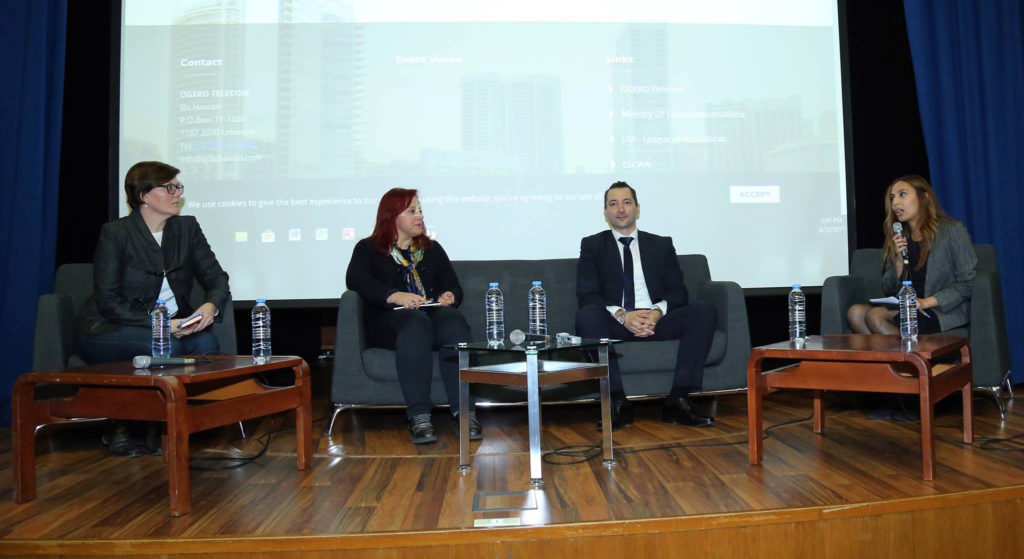Feature image via Lebanon IGF, Friday, December 8, 2017: Left to right: Jessica Dheere, Roula Mikhael, Dr. Charbel Chbeir, and Layal Bahnam discuss digital rights and responsibilities during the Lebanon IGF pre-launch event, “A Step Towards Achieving Sustainable Goals,” .
On Friday, December 8, the multistakeholder advisory committee of the Lebanon Internet Governance Forum (LIGF) held a pre-launch event titled the “Lebanese Forum on Internet Governance: A Step Towards Achieving Sustainable Goals,” ahead of the 2018 LIGF.
Representatives from the public and private sectors, academia, and civil society organizations, including SMEX, convened at the American University of Beirut (AUB) to discuss the state of digital rights, cybersecurity, and how internet technologies can spur development in Lebanon.
Dr. Yousif Asfour, the chief information officer at AUB, delivered the opening remarks. Bassel al-Ayoubi, chair of the LIGF and the director general of operations and maintenance at the Ministry of Telecommunications, traced the formation of the broader IGF. To kick off the first panel, “Digital Rights and Responsibilities,”Jessica Dheere, the co-director of SMEX, explained that we should be concerned with “policies that have repercussions on three key rights: free expression, assembly and association, and the right to privacy.”
Dr. Charbel Chbeir, member of the IT Committee and New Technologies at the Beirut Bar Association, which is currently studying a draft personal data protection law, agreed that access to information is important, but expressed concern that “we have no law that manages this information.”
During the second panel, “Internet for Development,” members of the public and private sectors detailed how they are using emerging internet technologies to foster development in Lebanon.
Dr. Asfour presented the collaborative technologies AUB is currently working on, including online courses and a tool for doctors from different countries to share their research. Georges Awad, the Project Officer for Communication and Information at UNESCO, listed a number of ways UNESCO is using the internet to help youth develop their skills.
Chief operating officer of the technology company Data Consult, Marc Nader, discussed the Beit Misk project, a smart city tracking data about the environment and residents’ habits, and how Facebook Messenger is used to “optimize” life in the city. Data Consult developed this smart city in collaboration with Lebanese telecom operator OGERO and other members of the LIGF.
Members of the audience asked Nader about the company’s data protection measures, to which he responded by saying the data will not be used for any other than its intended purpose.
National E-health Program Director Lina Abou Mrad presented on the Ministry of Public Health’s ongoing technology-centered initiatives, including an upcoming pilot program for the national drugs barcode program that will allow the ministry to track drugs and other goods.
Mrad elaborated on the challenges the ministry is facing in monitoring the success of similar programs, namely due to its limited resources. She also spoke of the ministry’s inability to make collected data publicly accessible until legal reforms are enacted.
This tension between the rapid development and adoption of new technologies and the relatively slow reforms to the law and to internet policies is one of the many reasons that led to the establishment of this forum. The LIGF advisory committee announced the launch of the LIGF website during the event and is planning to hold the first forum in mid-2018 to discuss these and other internet-related issues.


